 Petzlover
Petzlover Hortaya Borzaya is originated from Russia but Sapsali is originated from North Korea. Hortaya Borzaya may grow 15 cm / 6 inches higher than Sapsali. Hortaya Borzaya may weigh 8 kg / 18 pounds more than Sapsali. Hortaya Borzaya may live 3 years more than Sapsali. Both Hortaya Borzaya and Sapsali has almost same litter size. Hortaya Borzaya requires Low Maintenance. But Sapsali requires Moderate Maintenance
Hortaya Borzaya is originated from Russia but Sapsali is originated from North Korea. Hortaya Borzaya may grow 15 cm / 6 inches higher than Sapsali. Hortaya Borzaya may weigh 8 kg / 18 pounds more than Sapsali. Hortaya Borzaya may live 3 years more than Sapsali. Both Hortaya Borzaya and Sapsali has almost same litter size. Hortaya Borzaya requires Low Maintenance. But Sapsali requires Moderate Maintenance
 The Hortaya Borzaya is an ancient sighthound from Asia with its origins in Kievan Rus = Grand Duchy of Lithuania = Polish-Lithuanian Commonwealth and the Empire of Russia. The Hortaya is a large dog, especially a long in body dog with a muscular build suitable for running fast. He is one of the most talented of sighthounds, able to track moving prey at quite great distances. He is an intensely active when running prey and quiet and well balanced when not working.
The Hortaya Borzaya is an ancient sighthound from Asia with its origins in Kievan Rus = Grand Duchy of Lithuania = Polish-Lithuanian Commonwealth and the Empire of Russia. The Hortaya is a large dog, especially a long in body dog with a muscular build suitable for running fast. He is one of the most talented of sighthounds, able to track moving prey at quite great distances. He is an intensely active when running prey and quiet and well balanced when not working.
In Asia and Russia, it is still a working hunting dog, hunting a variety of game such as Saiga antelopes, wolves, foxes, and hares. With tremendous endurance, the Hortaya can run at great speeds and great distances on the hunt. The Hortaya Borzaya is a long distance runner rather than a sprinter like the greyhound we are all so familiar with. He also needs very little rest between runs of up to 4 km. The Hortaya uses his sense of smell as well as sight in the hunt. They hunt solo, in pairs or in packs.
It was not until 2004 that the Hortaya was first exported to Europe and given full breeding papers. They went to Germany, Slovakia and the Czech Republic in 2004. They went to Switzerland and Finland in 2005 and to the United States around 2005. Prior to this the Hortaya Borzaya was bred only in its original territory for thousands of years.
Unlike Western breeding programs, the Hortaya is not bred for the purpose of improving the breed. Like Asian thoroughbred horses the breed is considered “finished”. Because of this there was no inbreeding, linebreeding or incest. This is true for about 4-6 generations of a line. This helps the breed to stay healthy.
The breed was developed centuries ago being bred by many different groups of people throughout the region, making it impossible to say exactly where and how this Central Asian/Afghanistan/ southern Russian breed developed. The Russian Kynological Federation (RKF) member of the FCI, developed a standard for the Hortaya Borzaya, which unlike most breed standards, does not tell you what the Hortaya must be like. Instead it tells you what he cannot be.
It gives boundaries that the dog must fit inside in order to be considered a Hortaya Borzaya. This is because the breeds of these dogs in their native territories want to preserve as many different types and sub-types as possible under the banner of one breed. To most people these dogs would look like very different breeds. For this reason, they have not been accepted into International Breed Groups and Associations. The breeders of these dogs do not want to be tied down to one standard. They do not want the breed to be separated into western lines and the original line or show lines and working lines. They wish to keep all the dogs within one grouping.
The breed is recognized on the national level by the originating countries and federations, including Russia’s. There are an estimated 2500-3500 dog of this breed in existence to day. Only a few dozen of the breed exist outside of the original countries. In other Eastern and European countries, the dogs may be registered with hunting associations instead of a breed association.
The breed is held mostly by hunters in remote, local areas and villages that are fairly isolated. Here the Hortaya is seen as a partner in feeding the hunters family and the dog is invaluable. In these remote areas a good hunting dog is equal in value to the good horse. Both are essential to the hunter and his family’s livelihood.
The Hortaya Borzaya is a pack dog and does well with the family as well as an athletic hunter. They hunt in packs, small groups or alone and bring their catch back to the hunter for the family meal. No hunter had to go with the dog. In fact, the hunters would send the dogs several times for food. The Hortaya might travel for miles across tough terrain to get food for the family.
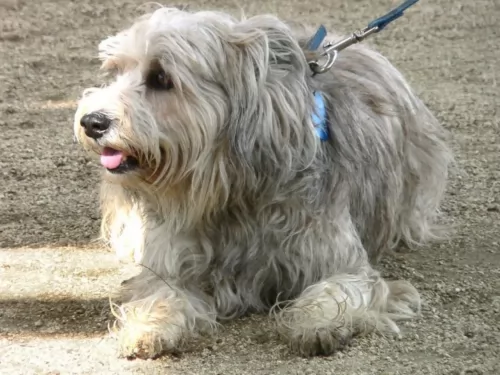 Early documentation of this dog tells us that it has been around for centuries and is therefore an ancient breed.
Early documentation of this dog tells us that it has been around for centuries and is therefore an ancient breed.
The Sapsali is a dog that comes from Korea and is also known as the Lion Dog, Sapsaree and Sapsal Gae. It is believed that these dogs were used to dispel evil spirits or ghosts.
The dog was given the status as National Treasure by the Korean Government in 1992 and is recognized by a number of local Korean dog societies. The dog isn’t however recognized by any of the major kennel clubs, but is affiliated with the Federation Cynologique Internationale (FCI).
When Korea was under Japanese rule, the dogs were slaughtered to make coats for its military and almost became extinct. Kennels were set up and the dog was revived again in the 1980s.
 This athletic sighthound is a handsome dog, ranging from large to giant. Remember there are many different ‘types’ of dogs within the one line/breed of Hortaya. Breed standards are exclusionary, and performance based rather than inclusionary, and appearance based. Still most of the breed lines share many of the same traits.
This athletic sighthound is a handsome dog, ranging from large to giant. Remember there are many different ‘types’ of dogs within the one line/breed of Hortaya. Breed standards are exclusionary, and performance based rather than inclusionary, and appearance based. Still most of the breed lines share many of the same traits.
They are a long legged breed with a very deep chest and flexible spine. They have immensely strong lungs and a narrow but long skull. Their gait is fluid, effortless trotting when not hunting. When she is hunting, they gallop like a horse and cover a lot of ground.
There eyes are usually black but can be any color and their fur is also any color. It is thick and dense. Finally, in the 2000’s, there were some dogs in a subline exported to Europe and to North America. Here, for this subgroup, a standard was established based on appearance and the color or the coat was now set at only white, blue, black, cream, red, sable and brindle, and piebald. They might or might not have a saddle. Definition of this type is still going on and has not been entirely settled yet. This standard is only for the European and American market show dogs.
These dogs, bred for show, have the same ability to run like the wind and for a very long time with his muscled body and long legs. The breed has strength and stamina that will fool you. He also has a long neck and broad back. He has thin, short ears.
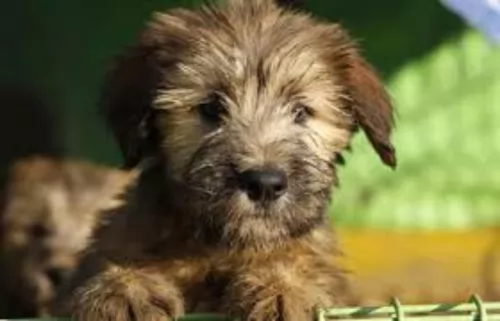 The Sapsali is a medium sized sheepdog standing at between 48 and 60cm in height and weighing between 16 and 27kg. He is a strong looking dog with the coat being long and dense and coming in quite a few color varieties. The coat can be solid in color but it can also be a mixture of blonde, reddish, brown and black. The hair of the dog also falls over the eyes.
The Sapsali is a medium sized sheepdog standing at between 48 and 60cm in height and weighing between 16 and 27kg. He is a strong looking dog with the coat being long and dense and coming in quite a few color varieties. The coat can be solid in color but it can also be a mixture of blonde, reddish, brown and black. The hair of the dog also falls over the eyes.
The dog has large eyes, the ears are also fairly large and the tail is long and held straight or down.
The dog is friendly, social and playful and also loving and loyal towards his human family. He is protective too and makes a good watchdog, but is never aggressive.
He gets on well with children as well as with other dogs. Training and socialization ensure obedience and good behavior and with a desire to please.
They’re intelligent dogs and training is easy. They’re gentle dogs too and this has made them a popular choice for therapy dogs. Their loving natures have been welcomed by patients suffering with trauma and the dog connects strongly with these people.
When back home he wants to be included in all the family activities. He is quite energetic and will require exercise every day – walks, hikes, frisbee, ball and rope games as well as more hectic hikes. He makes a good choice for the first time dog owner but is better suited to life in the suburbs or the countryside as opposed to being on a small property in the city.
 Children friendliness - yes, they are very good with children and will play with them for hours.
Children friendliness - yes, they are very good with children and will play with them for hours.
They have tremendous stamina, speed and intelligence to hunt on their own without the hunter and bring the prey back in good shape for the hunter’s family to eat.
No they are not very adaptable in terms of living arrangements. They will not do well in an apartment and probably not in the city as they need land to run.
Learning ability yes, they are intelligent and learn easily.
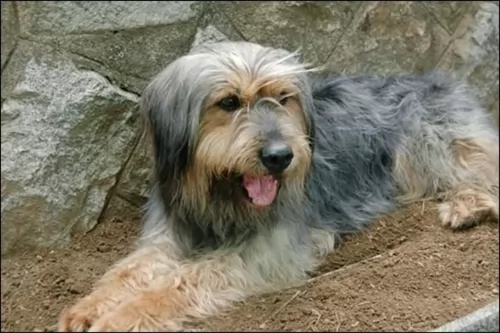 The beautiful Sapsali is a friendly, loving dog breed who is just a little bit wary around strangers.
The beautiful Sapsali is a friendly, loving dog breed who is just a little bit wary around strangers.
If he senses his master is alright around strangers, he will accept them too.
He is both protector and guard dog and gets on well with all members of the household. Apart from the long coat which can be a bit of a handful, this dog ticks all the right boxes in terms of being a most splendid family pet.
 As previously mentioned, the original breed is isolated and therefore has a pretty good health track record. Most of the breed specific illnesses or conditions that usually are inherited barely exist in this breed.
As previously mentioned, the original breed is isolated and therefore has a pretty good health track record. Most of the breed specific illnesses or conditions that usually are inherited barely exist in this breed.
They have a propensity toward obesity and diet is essential to prevent other issues.
Chronic or acute pancreatitis is possible because the breed developed eating small meals and hardly any meat. Too much meat or fat could cause this.
No tolerance for high protein dog food. Can cause puppies to have life threatening damage to bones and cartilage that is irreversible.
Bloat – because of the deep chest and the intolerance for large meals they are prone to bloat.
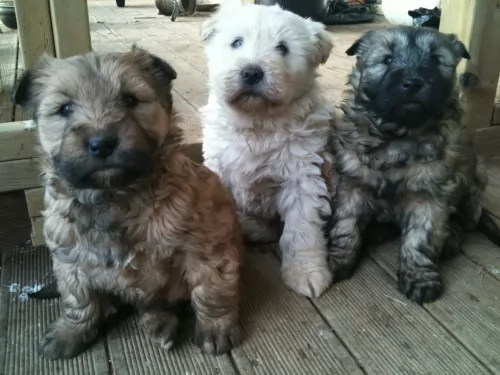 The Sapsali can live to be between 10 and 12 years of age, being a healthy breed. Like all purebreds, the dog will experience some health concerns, among which are heart disease, obesity, bloat, hip dysplasia and skin problems among others.
The Sapsali can live to be between 10 and 12 years of age, being a healthy breed. Like all purebreds, the dog will experience some health concerns, among which are heart disease, obesity, bloat, hip dysplasia and skin problems among others.
Dogs get heart disease just like human beings. The most common form of heart disease in dogs is valvular disease. Essentially it affects small breed dogs. Heartworm disease and dilated cardiomyopathy are also common forms of heart disease.
Sometimes there are symptoms and sometimes there aren’t, but as heart disease progresses it turns to congestive heart failure – the heart not being able to meet the body’s demands. Signs of this can be fatigue, difficulty with breathing, loss of appetite and weight loss, coughing and a distended abdomen.
If you see these signs, your pet will need to get to the vet. There is no cure for congestive heart failure but there are medications which can help the heart work better.
 As mentioned above do not overfeed a Hortaya Borzaya puppy. There is serious risk of irreversible damage if you do. Feed small meals 3-6 times a day with lower protein.
As mentioned above do not overfeed a Hortaya Borzaya puppy. There is serious risk of irreversible damage if you do. Feed small meals 3-6 times a day with lower protein.
3 cups of an average protein high quality dog food served at least 3-4 times per day. To avoid bloat do not feed large meals before or after exercise and don’t let your dog drink a lot of water at one time.
This is an extremely active dog bred to hunt 5-6 times a day over wide expanses of various and rough terrain. They need exercise. If you run, they will run with you happily and they will outlast you. They are good at and enjoy fetch, chase, agility, and field trials. They will last hours at any game they play.
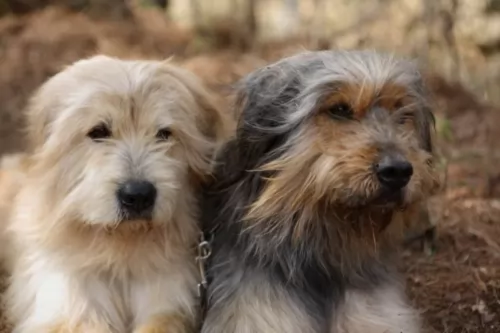 The Sapsali is covered in thick, long hair and the coat is going to require a lot of attention. It will be better to give the coat a brush every day as the coat can become very matted and tangled. The dog is also a heavy shedder so a regular brush will help to get rid of all that loose hair.
The Sapsali is covered in thick, long hair and the coat is going to require a lot of attention. It will be better to give the coat a brush every day as the coat can become very matted and tangled. The dog is also a heavy shedder so a regular brush will help to get rid of all that loose hair.
The Sapsali will need to have his ears, eyes and teeth regularly checked to ensure they are clear of any infection and to prevent any illnesses. A bad tooth can create many health issues throughout the dog’s body.
You can enhance your dog’s health by giving him good food. Commercially manufactured dog foods can be a good, convenient choice, more so if you choose the high quality ones known for their natural, quality ingredients.
To provide your dog with just a bit of variety in his diet, some home-made food added into the dry kibble from time to time will delight your pet. No need to make preparing the food a huge issue either. Boil brown rice and chicken in a pot and add in sweet potatoes, carrots and spinach.
Chop all this up and as a treat, add smaller portions of it into the dry kibble when you want to treat your dog. To avoid skin infections, try to include some raw meat into his diet occasionally. Never leave your pet without a constant source of fresh, cool water